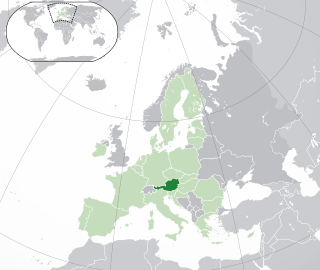This article concerns the systems of telecommunication in Austria. Austria has a highly developed and efficient telephone network, and has a number of radio and television broadcast stations.

Österreichischer Rundfunk is an Austrian national public service broadcaster. Funded from a combination of television licence fee revenue and limited on-air advertising, ORF is the dominant player in the Austrian broadcast media. Austria was the last country in continental Europe after Albania to allow nationwide private television broadcasting, although commercial TV channels from neighbouring Germany have been present in Austria on pay-TV and via terrestrial overspill since the 1980s.

The Austrian Football Association is the governing body of football in Austria. It organises the football league, Austrian Bundesliga, the Austrian Cup and the Austrian national team, as well as its female equivalent. It is based in the capital, Vienna.

Fritz Muliar, born as Friedrich Ludwig Stand, was an Austrian actor who, due to his huge popularity, is often referred to by his countrymen as Volksschauspieler.

Lesbian, gay, bisexual, and transgender (LGBT) rights in Austria have advanced significantly in the 21st century. Both male and female same-sex sexual activity are legal in Austria. Registered partnerships were introduced in 2010, giving same-sex couples some of the rights of marriage. Stepchild adoption was legalised in 2013, while full joint adoption was legalised by the Constitutional Court of Austria in January 2015. On 5 December 2017, the Austrian Constitutional Court decided to legalise same-sex marriage, and the ruling went into effect on 1 January 2019.

The Austrian Football Bundesliga is the top level of the Austrian football league system. The competition decides the Austrian national football champions, as well the country's entrants for the various European cups run by UEFA. Since Austria stayed in sixteenth place in the UEFA association coefficient rankings at the end of the 2015–16 season, the league gained its first spot for the UEFA Champions League. The Austrian Bundesliga, which began in the 1974–75 season, has been a separate registered association since 1 December 1991. It has been most won by the two Viennese giants Austria Wien, who were national champions 24 times, and Rapid Wien, who won the national title 32 times. Rapid's last title was in the 2007–08 season. The current champions are Red Bull Salzburg. Phillip Thonhauser is president of the Austrian Bundesliga. The Austrian Football Bundesliga is currently known as Tipico Bundesliga for sponsorship reasons.

Karl von Habsburg is an Austrian politician and the head of the House of Habsburg-Lorraine.

Islam in Austria is the largest minority religion in the country, practiced by 8% of the total population in 2016 according to the Austrian Academy of Sciences. The majority of Muslims in Austria belong to the Sunni denomination. Most Muslims came to Austria during the 1960s as migrant workers from Turkey and Yugoslavia. There are also communities of Arab and Afghan origin.
Football is the most popular sport in Austria. The Austrian Football Association, the ÖFB, was founded in 1904 and has been a member of FIFA since then. Despite the sport's popularity, except for a successful streak in the early 1930s, the country's national team has not been successful in tournaments. Austria played their first ever European championship as a qualifier in 2016, but finished last in their group and failed to advance. Their only prior appearance in the European championship was in 2008, but was promptly eliminated also at the group stage.

Radiofabrik is Salzburg’s community radio. It is an independent, non-commercial, non-profit radio station in Salzburg, Austria.
Television in Austria was introduced in 1955. The country uses DVB-T for broadcasting. Analog television was completely shut down on June 7, 2011. Austrian television was monopolized by government-owned television stations until 1996. The first private television station in Austria is ATV.
Österreich 2 is the overall term used to refer the network of nine regional radio services provided by Austria's national public service broadcasting organization ORF.
The ORF regional studios are branch offices from ORF in each state of Austria. Since 1975 there is also a regional office in Bolzano for the German-speaking population of South Tyrol, Italy.

Heinz Gerstinger was an Austrian writer, playwright and historian.

FS1 is a non-commercial community television channel in Salzburg (Austria). Next to the Community TV okto in Vienna and dorf in Linz, it is the third non-commercial broadcaster with a 24-hour full program in Austria.

Gerald Baumgartner is an Austrian association football coach who currently is the manager of SV Ried. He has been head coach of Red Bull Salzburg (A), Pasching, St. Pölten, Austria Wien and Austria Salzburg.
The Alliance of Community Television Austria is the alliance and lobbying group of non-commercial community television stations in Austria. The VCFÖ was established in 2010 as an association and has three members. The acceptance of the "Charta Community Television Austria" is mandatory for the membership.

Catholic Social Academy of Austria was established by the Austrian Catholic Bishops' Conference in 1958 with its seat in Vienna, Austria. Its mission is to "research, mediate, and convey the use of Catholic social teaching in practice" and it does this mainly through social analysis, political adult education, and organizational development.












